By JAN LARSON McLAUGHLIN
BG Independent News
The plastic bag ban ordinance received its first reading by Bowling Green City Council Monday evening. But the ordinance forming a sustainability board to work on such issues in the future was tabled.
The plastic bag ban will need two more readings before council can vote on it. If approved, the ban will go into effect at midnight on Jan. 1, 2021.
The ordinance prohibits the distribution of single-use, carryout, thin plastic bags made of plastic which has a thickness of 2.25 mills or less – typical bags handed out at grocery and retail stores.
Exempted will be the following:
- Bags the customer brought to the business location.
- Newspaper bags.
- Bags provided by a pharmacy for transporting prescriptions.
- Bags used to package a bulk item or to contain or wrap perishable items, including produce bags for fruits and vegetables.
- Bags used to transport frozen foods, meat, fish, flowers, plants or baked goods.
- Bags for transporting laundry or dry cleaning.
- Product bags (original packaging) such as bags used for packaging a product by a manufacturer or suppliers.
- Packages of multiple bags, such as food storage bags, garbage bags, pet waste bags.
- Non-profit organizations offering a food distribution program.
The ordinance also provides for an appeal process. Businesses or other organizations may appeal the plastic bag ban by applying for a temporary variance from the city. A fee of $75 will be charged for an appeal request.
A variance can be granted only for “extreme hardship.” No variance will exceed two years. The ordinance also addresses penalties. The municipal administrator shall have the right to waive any one instance of the fine if it is determined that a good faith effort to comply was being made by the violator.
Following is a list of the fines:
- The first violation will result in a written warning sent by U.S. mail to the location where the offense occurred.
- A second violation in a year will result in a fine of $100.
- A third violation in a year will result in a fine of $200.
- A fourth or subsequent violation in a year will result in a fine of $300 for each day such violation occurs.
The ordinance defines a “reusable bag” as one specifically designed and manufactured for multiple uses, that is thicker than 2.25 mills if made predominantly of plastic.

On Monday evening, citizen Joe DeMare cautioned City Council about a problem that occurred in California after thin plastic bags were banned in that state.
“Some stores will go with a slightly thicker bag,” so they aren’t violating the ordinance by still providing plastic bags.
“So the net effect can be more plastic going into the environment,” DeMare said.
DeMare also noted that the city may want to consider allowing plant-based plastic bags, but not petroleum based bags.
He also tried to relieve concerns about council members voting on the plastic bag ban themselves, rather than putting it on the ballot for citizens to vote on. DeMare said the ordinance before council is much more lax than the referendum considered by the Green Party. That referendum would have had an earlier start date, would not allow exemptions, and would not allow businesses to make appeals.
“This bill is the result of compromises,” DeMare said of council’s effort.
Also Monday evening, Mayor Dick Edwards asked City Council to consider tabling the ordinance that would have created a sustainability board. He instead suggested that the city first establish a sustainability advisory committee due to the complexities with setting up a volunteer board on sustainability issues.
Edwards said he agreed with Municipal Administrator Lori Tretter that a committee could help develop a strategic plan – with the establishment of a board as one possible outcome.
The mayor suggested the committee include members from industry, business, BGSU, students, plus residents from both the east and west sides of the city. The group would be asked to make recommendations to City Council by September of 2020.
When council came to the sustainability board ordinance on the agenda, Council President Mike Aspacher suggested that it be tabled.
Council member Bill Herald objected. He asked council to consider the research done by its Community Improvement Committee on the need for the board.
“It’s already got quite a bit of substance to it,” Herald said. “I think it would be beneficial to the community to proceed with this.”
Herald said he feared tabling of the ordinance could result in “another exhaustive review” that would drag out the formation of a sustainability board. That delay would mean council would “lose all momentum” on the issue, he said.
Aspacher said by tabling the ordinance, the city could begin immediately forming an advisory committee. “We will be moving on with the process,” he said.
Herald voted against tabling the ordinance. Voting in favor were Aspacher, Mark Hollenbaugh, Bruce Jeffers, Greg Robinette, Sandy Rowland and John Zanfardino.





